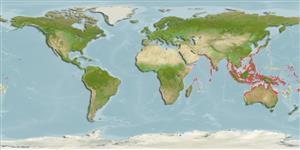Teleostei (teleosts) >
Acanthuriformes (Surgeonfishes) >
Scatophagidae (Scats)
Etymology: Scatophagus: Greek, skatophagos = feeding upon dung (Ref. 45335).
Eponymy: Argus (or Argos) was a 100–eyed watchman in Greek mythology. [...] (Ref. 128868), visit book page.
More on author: Linnaeus.
Environment: milieu / climate zone / depth range / distribution range
Ecology
Marine; freshwater; brackish; demersal; amphidromous (Ref. 51243); depth range 0 - 5 m (Ref. 90102). Tropical; 20°C - 28°C (Ref. 13371); 35°N - 33°S, 48°E - 171°W
Indo-Pacific: Kuwait to Fiji, north to southern Japan, south to New Caledonia. Reported from Samoa (Ref. 9710), Tonga (Ref. 53797), and the Society Islands (Ref. 2847).
Length at first maturity / Size / Weight / Age
Maturity: Lm ?, range 14 - ? cm
Max length : 45.0 cm TL male/unsexed; (Ref. 108711); common length : 20.0 cm TL male/unsexed; (Ref. 3489)
Dorsal spines (total): 10 - 11; Dorsal soft rays (total): 16 - 18; Anal spines: 4; Anal soft rays: 13 - 15. Ground colour greenish. Juveniles with a few large roundish blotches, about size of eye, or with about 5 or 6 broad, dark, vertical bars. In large adults, spots may be faint and restricted to dorsal part of flanks. Body quadrangular, strongly compressed. Dorsal head profile steep. Eye moderately large, its diameter somewhat smaller than snout length. Snout rounded. Mouth small, horizontal, not protractile. Teeth villiform, in several rows on jaws (ref 43044).
Inhabit harbors, natural embayments, brackish estuaries and the lower reaches of freshwater streams, frequently occurring among mangroves. Feed on worms, crustaceans, insects and plant matter (Ref. 7020, 44894, 48637). The dorsal, anal and pelvic spines are believed by Philippine fishers to be venomous and capable of inflicting wounds (Ref. 6565). Used in Chinese medicine (Ref. 12166). In Hong Kong live fish markets (Ref. 27253). Marketed as fresh (Ref. 12693).
Multiple spawner (Ref. 102820).
Allen, G.R., 1984. Scatophagidae. In W. Fischer and G. Bianchi (eds.) FAO species identification sheets for fishery purposes. Western Indian Ocean (Fishing Area 51). volume 4. [var. pag.]. FAO, Rome. (Ref. 3489)
IUCN Red List Status (Ref. 130435: Version 2024-1)
Human uses
Fisheries: minor commercial; aquaculture: commercial; aquarium: commercial
Tools
Special reports
Download XML
Internet sources
Estimates based on models
Preferred temperature (Ref.
123201): 25.4 - 29.3, mean 28.6 °C (based on 2701 cells).
Phylogenetic diversity index (Ref.
82804): PD
50 = 0.8125 [Uniqueness, from 0.5 = low to 2.0 = high].
Bayesian length-weight: a=0.03236 (0.02357 - 0.04442), b=2.92 (2.83 - 3.01), in cm total length, based on LWR estimates for this species (Ref.
93245).
Trophic level (Ref.
69278): 3.0 ±0.35 se; based on food items.
Generation time: 0.9 ( na - na) years. Estimated as median ln(3)/K based on 1
growth studies.
Resilience (Ref.
120179): High, minimum population doubling time less than 15 months (K=0.97; tm=1; Fec=486,500).
Fishing Vulnerability (Ref.
59153): Low vulnerability (20 of 100).
Nutrients (Ref.
124155): Calcium = 80.7 [40.4, 127.3] mg/100g; Iron = 0.8 [0.5, 1.4] mg/100g; Protein = 19.2 [18.0, 20.3] %; Omega3 = 0.0919 [, ] g/100g; Selenium = 28.9 [14.3, 62.6] μg/100g; VitaminA = 22.8 [6.1, 87.4] μg/100g; Zinc = 1.49 [0.96, 2.24] mg/100g (wet weight); based on
nutrient studies.
